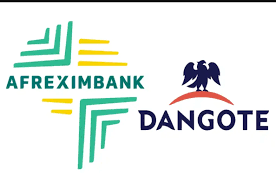The African Export-Import Bank (Afreximbank) has announced a significant $1.35 billion financing facility to support Dangote Industries Limited (DIL). This initiative is part of a larger $4 billion syndicated financing arrangement. This strategic commitment highlights Afreximbank’s leadership in promoting industrialization and energy transformation across Africa.
The financing facility is intended to refinance existing capital used in constructing the Dangote Petroleum Refinery and Petrochemicals Complex, which is the world’s largest single-train refinery, located in Lagos, Nigeria. The refinery, which began operations in 2024 and has an impressive refining capacity of 650,000 barrels per day, is expected to substantially reduce Africa’s reliance on imported refined petroleum products.
According to Afreximbank, the financing will assist with working capital, ensure a steady supply of crude oil, and improve product offtake as the refinery nears full operational capacity. This initiative is anticipated to significantly enhance Nigeria’s trade balance, create thousands of jobs, conserve foreign exchange, and promote intra-African trade.
Prof. Benedict Oramah, President and Chairman of Afreximbank, stated that the facility represents a significant step toward achieving energy security for the continent. He emphasized that the Dangote Refinery is a transformative asset for both Nigeria and Africa’s position in the global energy market.
Alhaji Aliko Dangote, President of DIL, expressed his gratitude for the support, saying, “Afreximbank’s consistent backing reflects our shared vision to industrialize Africa and supply high-quality refined products across the continent.”
This milestone aligns with the African Union’s Agenda 2063, which emphasizes industrial growth, regional integration, and sustainable development. The transaction also garnered strong participation from other prominent African and international financial institutions.
With Afreximbank leading the charge, this financing represents a crucial step in securing Africa’s energy future through homegrown solutions.




